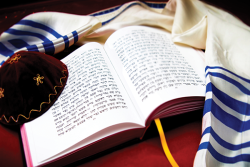Answers Are Important, But Questions Matter More
"Who's there?" is the first thing we read in Shakespeare's Hamlet. It encapsulates the topic of the entire play. "Where are you?" is the first question asked by God in the Torah (Genesis 3:9). From a metaphysical point of view, it captures the topic of the entire Bible.
Hearing the Cries of Mothers and Children
Pack your loads on my back. / Force me to your destination. / I will go the mile you demand, and even a mile further.
God as Matchmaker
With so many matchmaking and online dating services, it's no surprise that people are looking for love, but as a recent Pew study1 shows, their search results in marriage less and less often. That's because relationships of any kind are seldom easy.
Growing Up as the Favorite Son
Parashat Vayeishev introduces the Joseph saga. When it begins, Jacob’s 11th son, Joseph, is a 17-year-old shepherd working in the fields alongside his older brothers. The text’s description of him as a “youth,” na-ar, is apt, both biologically and emotionally. As Avivah Gottlieb Zornberg writes: “Joseph behaves with the narcissism of youth, with a dangerous unawareness of the inner worlds of others” (Zornberg, Genesis: The Beginning of Desire [Philadelphia: JPS,1995], p. 253). He consciously tells Jacob malicious tales about the brothers and by wearing the beautiful, multicolored coat (or ornamental tunic) that Jacob has given him, flaunts the fact that he is the favorite son. It is thus not surprising that when Joseph’s brothers see that their father loves him more than they, they come to hate Joseph (Genesis 37:4).
Forgiveness and Reconciliation with the Past
Many years ago, I taught an adult education class on biblical heroes. Among those we studied was Joseph. We focused on Parashat Mikeitz and discussed Joseph’s contentious relationship with his older brothers and their later reconciliation.
Revealing Oneself in Order to Heal
As Parashat Vayigash begins, Joseph still has not revealed his identity to his brothers. With Joseph having framed his younger brother Benjamin for stealing his divining goblet, and consequently declaring that as punishment, Benjamin will be enslaved in Egypt, his brother, Judah, now beseeches Joseph to enslave him instead (Genesis 44:33). His plea comes after Judah reminds Joseph that he has an elderly father and describes in detail, why Benjamin did not initially go down to Egypt with the brothers and why, should he not return to Canaan, their father literally would die (Genesis 44:31).
The Power and Protection of Angels
For as long as I can remember, I have believed in guardian angels.
On the Other Hand: Ten Minutes of Torah - Vayeishev: Making an Impact
Many of us know the story of Jacob and Esau, the brothers who could not be more different from one another.

